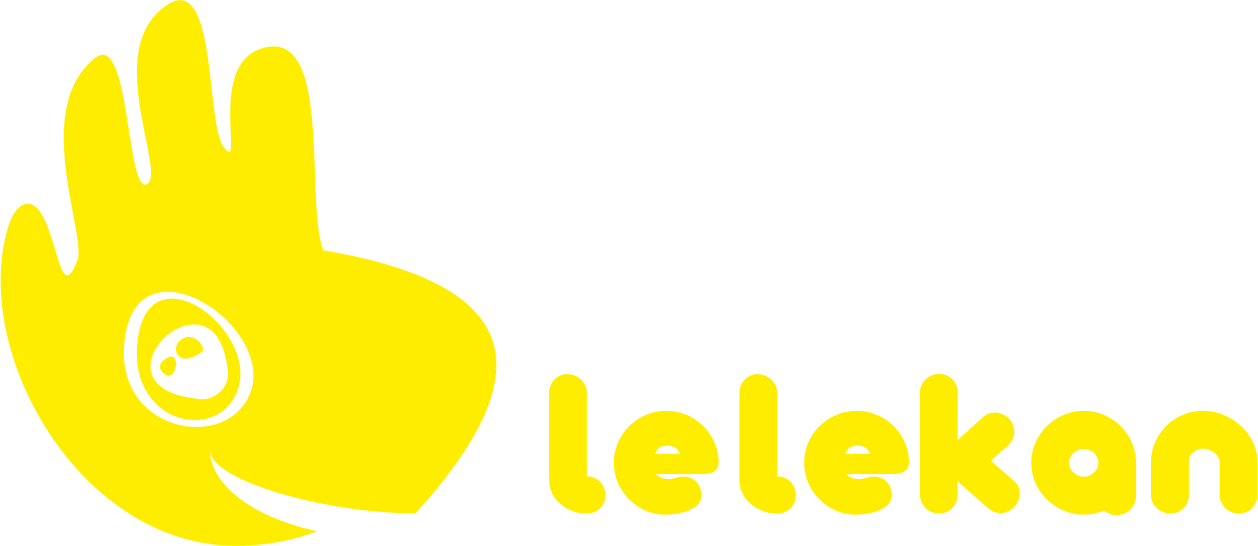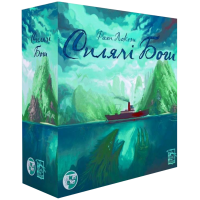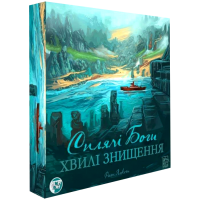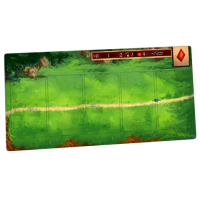Heir of the 7th Continent. Overview of the game Sleeping Gods
Related Products
Ryan Lockett has made a career out of creating decks that combine Euro mechanics with narrative. The most obvious example is "Near and Far", but a similar design can also be seen in "Above and Below" and in Empires of the Void II. Unfortunately, according to feelings, all these games did not carefully work out both of their components and did not merge them successfully into a single entity. However, with experience comes success. "Sleeping Gods" from the company Red Raven Games turned out to be a masterpiece.

The design approach of this game is very different from the company's previous games. Instead of trying to give equal attention to both the placement of the workers and the storytelling, the developer focused on creating a narrative that gradually unfolds. There's still resource management—almost overdone, perhaps—as well as combat resolution and skill check mechanics, but they're all clearly secondary to the stories of the Manticore's journey through a strange, faraway wonderland.
"Manticore" is your ship. A steamboat straight out of the 1920s with a crew of nine — that is, characters that you, the players, will control together. It all begins like a plot from Ravenloft: a steamship falls into a thick fog and ends up in an unfamiliar sea. Surprises, amazing discoveries and difficult moral decisions await you.
The game is apparently inspired by the recent hits "The 7th Continent" and "Tainted Grail". It invites players to explore an open world while requiring close attention to health and fatigue management for both team members and Manticores: the right to move on must be earned.
The approach to narrative in The Sleeping Gods is a cross between its two predecessors.
"The 7th Continent" sets you the task of removing the curse, focusing on several faint hints of evidence. Along the way, like a pigeon rushing between scattered pieces of bread, you will encounter many side tasks and other interesting distractions from the main task. It even seemed that the main plot was needed only as a motivation to explore the continent. Unfortunately, this has hurt Continent 7, because the gameplay is based on a vicious circle of resource gathering, and it's so monotonous that you gradually begin to wish Continent 7 would fail the hell out of it.
"Tainted Grail" is its opposite: a clear focus on the plot. If you don't follow the main story line of searching for King Arthur's legacy in a cataclysmic Britain, you'll be stuck endlessly hauling resources to menhir statues to light them. The game became successful only thanks to a very high-quality plot.
In "Sleeping Gods" there are no such or other flaws. Although you will have to spend time resting and healing, the grind is much less here. Instead, the gameplay is focused on visiting locations and exploring them, or interacting with locals. This goes well with the main task, which no one forces you to rush: collect totems and use them to awaken the sleeping gods in exchange for freedom.
It's especially notable that what's happening doesn't feel like a set of simple stories, even though the game is essentially a huge collection of side quests. Each little errand you take on - like "go to the west of the island and find the lost sword" or "go south and find my son" - is unrelated to the main plot, but the atmosphere of participating in one big adventure is never lost .
The design of "Manticore" is made according to the same principle. Because players control multiple crew members—each with their own personality and special abilities—you're tied to a ship and can't go on independent voyages, unlike the two Sleeping Gods predecessors.
This is a very important point for several reasons. First, the game is fully revealed, regardless of the number of players. Each team member will be involved regardless of the number of players. Thanks to this, "Sleeping Gods" are also very good in solo, and they open up perfectly in cooperative mode. Secondly, the general involvement in the gameplay is preserved. When you get into combat (which doesn't happen often), everyone is involved. When you read an excerpt from a storybook, everyone is interested to hear what's in there. Although leadership may shift from one player to another from turn to turn, the emphasis remains on the importance of each player.
The way all these separate quests are tied into a ball around a miniature steamer, causes some pleasant warm feelings. One of the central themes of the plot is sailing the seas of a mysterious world, but in reality the world is floating around you. All great things happen because of your efforts and your decisions. Let the world of the "Sleeping Gods" not be your personal creation, but its fate is solely in your hands.

One of the hallmarks of Red Raven Games' style is that the worlds they create are… not entirely serious. Therefore, "Sleeping Gods" is perceived more as juvenile literature than a serious dramatic work. In "Desecrated Grail" there is grimdark, here it is more playful and eccentric. At times, Sleeping Gods gets a little dark and creepy, but overall, this adventure is suitable for the whole family. On the one hand, this is an advantage in terms of general accessibility, on the other hand, the plot of "Sleeping Gods" cannot touch on deep and important topics raised in classical literature. Nevertheless, the plot is generally well-written and clearly corresponds to the chosen style.
It is also worth noting the mechanics of keywords. It could be called innovative if it wasn't already used in Farther and Closer and The Unholy Grail, but it's still beautifully designed and serves as one of the foundations of the gameplay.
The bottom line is that you get all kinds of quests when you meet strangers or explore locations. Quests are drawn from a huge deck of cards, and after a while you will have a whole sea of them. Players will periodically take one card or another, trying to remember why they agreed to deliver a statue of a one-eyed macaque to an old woman on the other side of the world; it is recommended to take notes.
At the bottom of each card is a keyword. When you visit a location, you may be asked if you have certain keywords. Access to additional options depends on their availability. This is how the plot branches out. Some triggers can even remain relevant until the finale and affect the ending.
The game does not force you to follow an exact storyline, but allows you to wander through a dynamic world, as if flipping through the pages of a handbook. Each quest is another piece of the general history of the world. Playing Sleeping Gods is like slowly painting a picture, stroke by stroke, until the individual elements come together into a single picture.

If there is any element that is not fully thought out in the game, it is the difficulty. In general, it feels good: there is a certain challenge, but it is not fatally difficult. However, the difficulty can vary greatly during a game. Choosing certain story options or failing quests can have many outcomes that will drain your resources or ability to fight effectively. It snowballs: the more failures, the harder it becomes to play, and the more failures and frustration. On the other hand, finding a powerful totem can greatly increase the combat potential or utility of team members. Find some powerful weapons and the next fight with a group of minotaurs will be like kindergarten.
Death isn't a big deal here, as it just speeds up the game timer by sending event cards to reset. This heightens the tension, but you'll still reach a compellingly interesting ending regardless of your accomplishments. Interestingly, with great efficiency of the processes, it will be difficult to reach a gloomy ending.
The save system is also a shaky aspect of Sleeping Gods. No matter how cool it is, taking it all apart and then putting it back together is a headache. You need bags for each of the team members, for tokens of status effects. Retention sheets must be filled out. It will also not work to play a game in the mode of single sessions or start another campaign in the current process. Of course, all this is not a problem if you have the opportunity to leave the game spread out on the table, but this luxury is not available to everyone.
The last ambiguous aspect of the game is that the map on which you navigate and take notes immediately includes elements from the Tides of Ruin expansion. Without the addition, some areas on the map will be inaccessible. It cannot be said that without it the experience is inferior, but still there is an unpleasant feeling. In addition, the addition is made first-class, and not screwed to the base retroactively.

Despite its few flaws, "Sleeping Gods" is impressive.
There is a lot of component management here. Yes, you hang fatigue on team members to increase the chances of passing the test. Characters gain new abilities over time through skill cards, as well as treasures and equipment. The gaming table can be full of balls.
However, the game does not become overwhelming because each individual element is simple and does not require much management. This is facilitated by the licked structure of the move. You take an action on the ship board, draw an event card (they act as a timer), then take two personal actions. The next player does the same - and so on in a circle. You can easily take a break at any moment.
Thanks to a minimum of obstacles, you can immerse yourself in the gameplay without any problems. "Sleeping Gods" is one of those games where you don't notice how fast time flies. "Now, just make one more move..."
Reducing combat elements to a minimum, simple inspection mechanics, lack of tedious management - all this allows the game to breathe fully and offer players a very pleasant frivolous adventure. "7th continent" felt like hard work; too monotonous after the moment when the excitement of the first sensations subsided. The Despised Grail threw up a lot of limitations at times, but I still pushed through them for the compelling plot. Perhaps the most interesting moments of "Sleeping Gods" will not cause the same excitement as the most interesting moments of "Grail" or "Continent", but "Sleeping Gods" is a consistently high-quality atmosphere and gameplay that does not lead you on a leash and does not hide the most delicious things behind a string endless obstacles.
It is also worth paying tribute to the map in the form of a book. The system is much more elaborate than the card system in the predecessors of "Sleeping Gods". Thanks to this, to lay out a new location, it is enough to turn the page - that's all. The Grail and Continent formats provide more narrative dynamics: for example, in the Grail, a city can fall to be overrun by monsters, and then the starting location is replaced by another map, but the cost of such a format - unfriendliness to players - is too high.
The gameplay and plot of "Sleeping Gods" are kept at a decent level throughout your journey. The amount of content in the box is staggering; you'll only see about a quarter of the quests and only one of the 13 endings in one playthrough, so there'll be an incentive to return to the mysterious islands. Sometimes the game can start to lose its luster, especially if you miss big plot threads, but then it will draw you back in with new quirky plot twists. She knows perfectly well how not to let you go until the last one. "Sleeping Gods" is very, very good.









